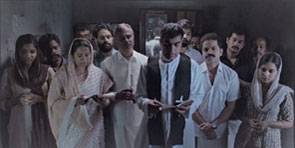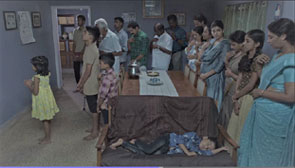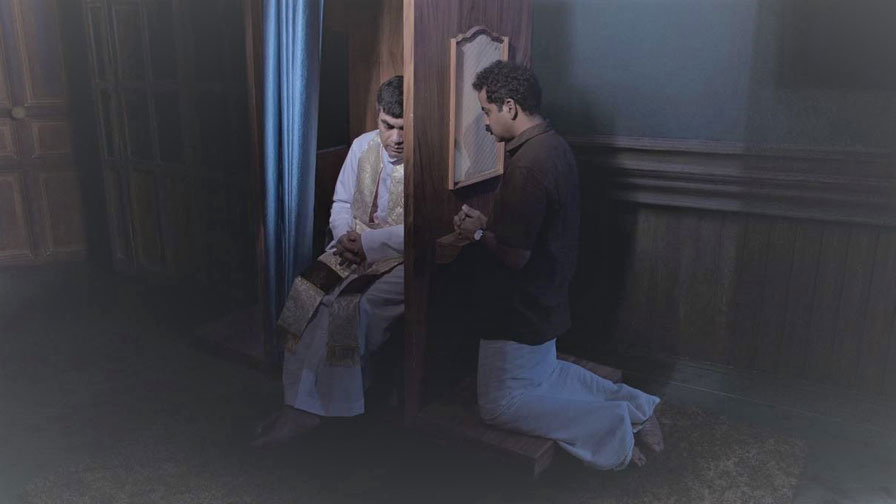We are a family, and the loyalty of the family must come before anything and everyone else. For if we honour that commitment, we will never be vanquished – but if we falter in that loyalty we will all be condemned.
–Mario Puzo, The Family
If a body catch a body coming through the rye.” “I keep picturing all these little kids playing in this big field of rye and all. And nobody’s around—nobody big, I mean—except me. What I have to do, I have to catch everybody …. I mean … I have to come out from somewhere and catch them. That’s all I do all day. I’d just be the catcher in the rye and all. I know it’s crazy, but that’s the only thing I’d really like to be. I know it’s crazy.
–J D Salinger, The Catcher in the Rye
The above passage from Salinger’s eponymous classic could very well aptly apply to Malayalam film director Don Palathara’s Sony–the Man Friday, the Eternal Do-Gooder, the Rainmaker–of his Christian commune, the family. Sheathed in sheep’s skin, stealthily hiding the stalking traits of a predator behind the camouflage he so cleverly wears, he wins the confidence, trust and goodwill of his unsuspecting community.
Salinger’s Holden Caulfield is a hunter, hunting innocence—not to ravish or pulverise it, but to save it, to nurture it, and give it space. Sony, on the other hand, behind the naïve, chameleon façade he fronts, is a noxious and nefarious satyromaniac despoiling innocents led unto his satanic acre in implicit faith he would deliver good education to them.
After all, this jobless, all errands man, is most sought after to tutor (he had been running a tutorial centre now shut down) those that are poor of poetry or weak in maths what have you.
Aided, abetted and assisted, of course, by the Family that constitutes the universe around him. Blinkered and ignorant of the blighted existence their benign hearted Sony lives, freely prowling and preying upon the Holy Innocents with impunity thrusted unto his lair.
In fact, one could say Sony is Palathara’s hideous Holden, unlike Salinger’s, habituated to satiate his lustful hunger preying on right before the righteous eyes of the Family that Sony comes from.
Through Sony’s “instinctual, insatiable, pedophiliac disposition” to “prey on pubescent children” Don Palathara starkly spotlights on the harsh realities of physical violence, sexual abuse, and societal corruption, in his latest directorial visitation in The Family.
With the church, and the community he comes from, blissfully brushing aside his felonies going against all Catholic precepts, taken in by his geniality, Sony scours, stalks and satiates his inner demon with wanton abandon.
 Brushing aside any aspersions being cast on dear Sony says the man’s aunt, a nun, “Sony is bit over friendly with children” assertively dismissive of sister Rani’s misgivings about Sony’s trespasses stating “you had your share of silliness” vainly observing “everybody makes mistakes.”
Brushing aside any aspersions being cast on dear Sony says the man’s aunt, a nun, “Sony is bit over friendly with children” assertively dismissive of sister Rani’s misgivings about Sony’s trespasses stating “you had your share of silliness” vainly observing “everybody makes mistakes.”
In fact, akin to Pope Alexander VI in Mario Puzo’s The Family, belief that “God will ultimately forgive his many sins simply because, as pope, he is infallible and divine,” Sony’s nun-aunt too is convinced that he will be forgiven of all his transgressions, the Lord Jesus “who purifies sinners” would “wash away the sins of brothers and sisters,” as goes the priest’s litany in the wake of the suicide of a member in Family.
With the powers that be turning a blind eye to Sony’s treacherous trysts be it with Subi seeking to know to write poetry, or Stephy wanting to better in maths or the much older Aleema who is abused even as the family prays for the departed soul, the demonic man has a free run with the young ones around.
As if that was won’t enough you have Sony being asked to teach the students of the community schools thereby opening the field for exploitation even more widen open the Family or the Commune ensures the lascivious leopard has enough meat to feast upon for a lifetime.
For, after all, “it all begins with the family, that’s where all the vocations come from. Priests, sisters, brothers, deacons, we do not come flying down from heaven. We come from families.” (Eduardo Nevares, Roman Catholic bishop 1954)
Indeed, Sony and his saviours too form part of this ubiquitous assemblage that provide him the convenience, the comfort, and canvas to go about his business of charm offensive violations gleefully.
It may be posited that Palathara’s Family, coincidentally comes at a time when exalted Christian institutions the world over have been on the global scanner for all the embarrassing and wrong reasons.
From the hallowed, holiest of holy cities of The Vatican to God’s Own Country – Kerala – nearer home, paedophiles and sexual predators of the faithful having had a home run now in the public glare being tried for their infractions.
So much so, The Pope Francis himself, in the now famous documentary – Amen: The Pope Answers has had to face a barrage of disquieting questions from the young faithfuls, accepting “there is something rotten in the hallowed institutions of the Christian faith.”
That the misdeeds of several wearing the cloak and habit have come to fore and faithfuls are seeking affirmative answers from the Vatican’s Holy See speaks of the sordid state of affairs.
 To a question by a victim that there is a lot of hypocrisy within the church, with its tendency to siding with the predator, the Pope concedes the problem is serious. More so, “cases involving the churches worse because people are destroyed exactly where they should be care for. The abuser destroys the child. If you are a church person hypocrisy and double living are horrible,” laments the Pope, unable to provide an assuring answer to the young man.
To a question by a victim that there is a lot of hypocrisy within the church, with its tendency to siding with the predator, the Pope concedes the problem is serious. More so, “cases involving the churches worse because people are destroyed exactly where they should be care for. The abuser destroys the child. If you are a church person hypocrisy and double living are horrible,” laments the Pope, unable to provide an assuring answer to the young man.
True. Rightly taking a cue from recent incidents that have rocked the hallowed institutions, director Don Palathara has sought to shed spotlight on the malfeasance in Family.
However, despite his exalted intentions, where Palathara’s Family falls short, while disclosing the despicable duplicity of adults and irreparable loss of innocence of children, is he turns Family more into an “architectural design construct” rather than haunting human drama with facile Deus ex Machinafinish.
Palathara sadly sacrifices humanistic, socialistic, and accessible approach to the narrative,spicing Family with his panoply of trademark and recurrent Christian imagery, motifs, symbols he draws sustenance from.
His overt preoccupation with niceties of minimalismand sparseness of form, preconceived set piece design constructions and highly nuanced aesthetics turn Family is more of a cinematographic experimentation.
Palathara who showed promise and provenance in his very first cinematic sojourn with the 2015, black and white Savam: The Corpse, through the fluent cinematography, stark visual imageries and his preoccupation with the workings of Christian institutions has once again sought to spotlight on the hallowed seminary in Family and the shepherded folk that follow the faith.
In the process Family comes across a complex film about the insidiousness of a community’s self-preservation conveniently brushing aside the quotidian conspiracy under the umbrella of virtuousness and righteousness and hoping St Thomas would “protect them (the children) keenly, as they “roam” the wilderness in carefree abandon, as also with “showers of mercy” on the culpable wrong-doers.
References:
Editorial desk. Catholic News Agency. New Phoenix auxiliary bishop learned importance of faith from family.
See also:
https://filmcriticscircle.com/journal/family/

Leave a Reply
You must be logged in to post a comment.